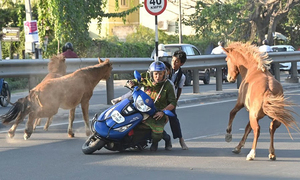GM 곡물 재배 등 증산 힘써야
 |
| 리처드 G 루거 美 상원의원 |
지난해 세계에서 발생한 식량위기가 주목을 받았다. 세계의 곡물 가격이 폭등하자 항의하는 폭동과 시위가 19개국에서 벌어졌다. 현재 세계경제의 붕괴로 수백만명의 빈민이 추가로 발생하여 식량 조달 능력을 상실할 위험에 처했다.
세계의 장기적인 식량 공급 전망 역시 어둡다. 예상되는 인구 증가와 소득 증대 및 육류 소비 확대를 기초로 계산할 때 세계의 농업 생산량을 2050년까지 배로 늘릴 필요가 있다. 식량 증산의 장애 요인도 만만치 않다. 물의 공급량이 줄고 기후변화가 심해질 가능성이 크다. 기후는 더욱 불규칙적으로 변화하고 가뭄도 더 빈번해질 전망이다. 해수면이 상승하여, 생산성이 가장 높은 강 하구의 비옥한 삼각주가 대거 물에 잠길 가능성도 있다.
농경지 확장을 통한 2배의 식량생산 노력은 광범한 삼림 벌채를 초래하고 지역 생태환경에 심한 스트레스를 주게 된다. 농부들이 기존의 경작지에서 산출량을 늘리려면 인프라 및 농업 기술에 대대적인 투자를 할 필요가 있다.
기아 및 식량 부족으로 인한 각종 질병은 인도적인 비극이다. 매일 2만5000명으로 추산되는 사람들이 영양실조와 관련된 원인으로 죽어간다. 굶주린 어린이들이 가장 큰 피해자다. 어린이들의 생존율이 낮아지고 정신 및 신체 발달의 장애를 겪는다.
기아는 국제평화와 미국의 안보와도 깊은 관계가 있다. 굶주린 사람들은 자포자기하고 절망은 분쟁과 과격 행위의 원인이 된다. 치솟는 에너지 가격과 여러 지역의 가뭄, 식량 수출국들의 잘못된 결정이 작년과 같은 곡물가격 폭등을 초래하고 세계의 농업 구조가 취약하다는 사실을 드러냈다.
1960년대와 1970년대의 녹색혁명이 성공했을 때 인류는 기아의 망령을 이겨낸 것으로 보였다. 국제사회는 기아와의 싸움에서 이겼다는 결론을 성급하게 내리고 경계심을 풀었다.
농업 부문 투자는 급격히 줄었다. 2007년 부유한 나라들은 해외원조의 4%만 농업부문에 제공했다.
식량난이 가장 심각한 아프리카에서는 농업부문에 대한 해외원조가 1989년 41억달러에서 2006년에는 19억달러로 급감했다. 아프리카의 주식인 옥수수의 1인당 생산량은 1980년 이후 14%가 줄었다.
새로운 농업기술 및 신품종 개발을 위한 투자의 감소도 식량문제를 악화시킨다. 산출량이 더 많고 악천후에 더 잘 견디며 병충해에 강하고 영양이 더 많은 신품종 개발이 중요하다.
세계는 새로운 녹색혁명이 필요하다. 미국이 앞장선 기아 퇴치에 다른 나라들이 호응할 필요가 있다. 새로운 녹색혁명은, 바이오기술과 유전자조작(GM) 종자 같은 새로운 도구를 이용하지 않고는 성공할 수 없다. 이 두 가지는 대규모 식량 증산을 가능케 한다.
GM 농산물은 안전성이 입증되었고 살충제 사용량을 줄이는 데 성공했다, 또 생산량을 높이고 악천후에 대한 내성이 입증되었지만 유럽인들은 GM 신품종 재배에 반대한다. 바이오 기술에 반대하는 유럽의 적극적인 로비의 위세에 눌린 아프리카 국가들이 특히 GM 농산물을 활용하지 못한다. 미국을 비롯한 세계의 다수 지역에서 GM 곡물이 재배되고 미국은 옥수수의 80%가 GM 품종이다.
안전한 GM 기술에 대한 유럽의 반대는 단기적으로 아프리카의 기아를 악화시킨다. 장기적으로는 기후변화에 농업을 적응시키기 위해 노력하는 국가들에 치명적인 타격을 가할 수 있다. 기후변화에 관한 현재의 예상이 맞다면 아프리카의 농업생산은 앞으로 10년 동안 35% 줄어들어 기아 발생 및 대량 이주와 분쟁의 원인이 될 수 있다.
아프리카 농업에 과학과 기술을 응용하는 길만이 그러한 재앙을 피할 수 있다.
리처드 G 루거 美 상원의원
워싱턴 타임스·정리=오성환 외신전문위원
A new green revolution
Richard G. Lugar and Norman Borlaug
The world is not producing enough food, and many poor families cannot afford to buy the food that is available. As a result, nearly a billion people, a sixth of the Earth's population, do not have enough to eat.
This global food crisis erupted into public view last year when food prices spiked around the world and food riots and demonstrations rocked 19 countries, from Bangladesh to Egypt. Today's worldwide economic collapse threatens to push millions more into poverty, making them unable to buy enough food to feed their families.
The long-term prospects for global food supplies are equally troubling. Based on expected population growth, rising incomes and wider meat consumption, it is estimated that the world's farmers will have to double their output by 2050. They will have to do so in the face of rapidly depleting water supplies and the impact of climate change, which threatens altered weather patterns and droughts. Moreover, rising sea levels could submerge river deltas that are among the most agriculturally productive regions on Earth.
Attempting to double food production by increasing the acreage under cultivation would cause widespread deforestation and put significant stress on local ecologies. Farmers will have to get much higher yields from land already in production, requiring major investments in infrastructure and agricultural technology.
The hunger and related diseases resulting from food insecurity are a humanitarian tragedy: An estimated 25,000 people per day die of malnutrition-related causes. Hungry children suffer worst, with low survival rates, stunted bodies and impaired cognitive development. Moreover, hunger has profound implications for peace and U.S. national security. Hungry people are desperate, and desperation often sows seeds of conflict and extremism.
The causes of this calamity are many. Acute factors such as soaring energy prices, local droughts and bad decisions by food-exporting countries led to last year's price spike and exposed structural weaknesses in the world agriculture system. After the green revolution of the 1960s and 1970s seemingly vanquished the specter of world famine, the international community prematurely declared victory over hunger and let down its guard.
Investments in agriculture tumbled. By 2007, rich countries devoted merely 4 percent of their foreign assistance to agriculture. U.S. agricultural aid, adjusted for inflation, fell 80 percent from the 1980s to the early 2000s.
In Africa, which has the most severe food problems, donor aid to the farm sector plunged from $4.1 billion in 1989 to just $1.9 billion in 2006. Africa's per capita production of corn, its most important staple crop, has dropped by 14 percent since 1980.
Equally troubling are sharp cutbacks in research into new farming technologies and seed varieties that could increase yields, cope with changing climate conditions, battle new pests and diseases and make food more nutritious.
The world needs a new green revolution. The Lugar-Casey Global Food Security Act, S. 384, introduced in February, could help launch one. The Foreign Relations Committee approved the bill April 1, and it can now move toward consideration by the full Senate.
The legislation calls for the United States to make food and agriculture a foreign policy priority. It would require the administration to appoint a high-level coordinator to devise and implement a governmentwide food security strategy, and it would authorize $10 billion over five years for foreign agriculture assistance, with special attention to research and outreach, so small farmers can quickly utilize breakthroughs made in the laboratory. Helping small farmers raises rural incomes, thus easing poverty, hunger's chief cause.
If the United States leads the battle to eradicate hunger, other nations will follow.
This new revolution won't succeed without new tools, namely biotechnology and genetically modified (GM) seeds, to meet the enormous demands for increased production. But Europeans oppose most GM technology, despite its proven safety and success in cutting pesticide use, raising output and adapting to adverse conditions. African countries in particular have been intimidated by aggressive European lobbying from deploying biotechnology, widely used in many places, including America - GM varieties comprise 80 percent of our corn crop.
European opposition to safe GM technology contributes to African hunger in the short run. In the long run, it virtually dooms those countries' efforts to adapt their agriculture to changing climate conditions. If current global climate forecasts are right, farm yields in Africa could plummet by 35 percent in coming decades, leading to starvation, mass migration and conflict. Only through the application of science and technology to African agriculture can such a catastrophe be averted.
Thomas Malthus warned 200 years ago that food production would not keep pace with population growth. He did not foresee how technology and innovation would forestall his dire predictions. Today, we can either succumb to Malthusian pessimism or once again invest in agriculture and embrace technological solutions inspired by the green revolution. It is both a moral and security imperative that we act.
erupt:폭발하다 malnutrition:영양실조 implication:암시, 의미, 관계
Copyright ⓒ 세계일보. 무단 전재 및 재배포 금지
![[설왕설래] 연명 의료 중단 인센티브](http://img.segye.com/content/image/2025/12/17/128/20251217518575.jpg
)
![[세계타워] 같은 천막인데 결과는 달랐다](http://img.segye.com/content/image/2025/12/17/128/20251217518533.jpg
)
![[세계포럼] 우리가 알던 미국이 아니라고?](http://img.segye.com/content/image/2025/09/10/128/20250910520139.jpg
)
![[열린마당] 새해 K바이오 도약을 기대하며](http://img.segye.com/content/image/2025/12/17/128/20251217518355.jpg
)








